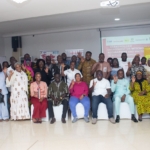
The Human Rights Select Committee of Parliament has given assurance that it would work with Parliament and the government to reintroduce the Anti-Witchcraft Accusations Bill for passage into law and subsequent assent for it to become law.
Chairperson of the Human Rights Select Committee of Parliament, Ernest Yaw Anim, who gave the assurance on behalf of Members of the Committee at a media and stakeholders briefing in Tamale, said the law would help to protect the rights of people accused of witchcraft while punishing the perpetrators.
The media and stakeholders’ briefing was the end of the Members of the Committee’s three-day tour to the alleged witches’ camps in the Northern and Northeastern Regions, which was facilitated by the Coalition Against Witchcraft Accusations (CAWA), a group of Civil Society Organisations (CSOs) working to stop witchcraft accusations in the country.
Members of the Committee, accompanied by representatives of CAWA, visited the Gnani and Kukuo alleged witches’ camps in the Northern Region and the Gambaga alleged witches’ camp in the Northeast Region.
CAWA is made up of Songtaba, ActionAid Ghana, Oxfam in Ghana, Amnesty International, and the Sanneh Institute.
Members of the Committee who were part of the visit included Ernest Anim (Chairperson), Elvis Dapaah, Anthony Sumah, Onyina Acheampong, Frank Asiedu Bekoe, Ohene Kwame Frimpong, Laurentia Gewornu, and Alfred Nii Kotei.
The visit was a fact-finding mission to directly engage the inmates and other stakeholders in the area to learn about their challenges to inform the Committee’s work.
The Anti-Witchcraft Accusations Bill was passed by the eighth Parliament as a private member’s bill, but the then-President failed to assent to it to become law; hence, the advocacy to get it passed by the current Parliament.
Mr Anim said, “The camps we visited reflect a reality that our mothers, sisters, and daughters have found refuge there, but their presence also represents a challenge because it reflects deeper issues of stigma and fear.”
He said the Committee would compile a report about its findings to present to the Speaker of Parliament and engage Ministries and stakeholders to design strategies to reintegrate the inmates into their communities.
He said witchcraft accusations leading to banishing people from their communities should not have a place in the 21st century, adding, “We need to have a lot more community sensitisation for people to understand that every single human being deserves their basic fundamental human rights.”
The Committee donated GHc3,000.00 and a Television Set to the Gambaga alleged witches camp, GHc5,000.00 to the Gnani alleged witches camp, and GHc2,000.00 to the Kukuo alleged witches camp, calling on corporate bodies, religious groups, and traditional authorities to support the women’s protection and reintegration.
Greater Accra Regional Minister Linda Ocloo said the Anti-Witchcraft Accusations Bill was about restoring dignity and ensuring that no citizen stood in the face of unfounded accusations.
She said, “As Regional Minister, I wish to assure the Committee and all partners that we will continue to work hand in hand with Parliament, traditional authorities, faith groups, and CSOs to reintegrate the victims, extend social protection to them, and create a more inclusive society.”
Hajia Lamnatu Adam, Executive Director of Songtaba, said poverty, illiteracy, and widowhood were some of the key drivers of witchcraft accusations and called for the use of public education strategies to address the situation.
A representative of Amnesty International appealed to the Speaker of Parliament to let the Bill be considered under a certificate of urgency, saying, “The Bill not only criminalises witchcraft accusations but also protects those who are accused.”